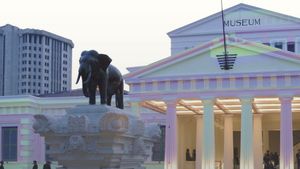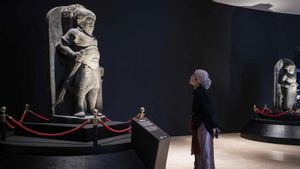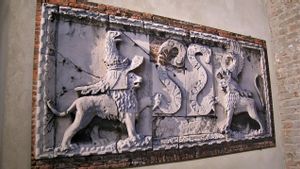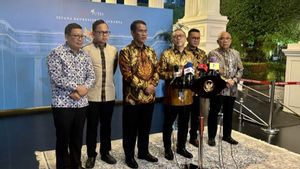JAKARTA - The Christmas and New Year holidays brought the Indonesian National Museum on Jalan Medan Merdeka Barat to record the highest visit, with nearly 13,000 people crowding the location in one day.
Visitors looked enthusiastic, even willing to queue long to witness the collection of artifacts and cultural heritage of the archipelago exhibited at this museum.
One of the main attractions is an exhibition titled Indonesia, The Oldest Civilization on Earth? 130 Years After Pithecanthropus erectus.
The exhibition, which began on December 20, 2024 and will last until April 2025, has attracted thousands of visitors in just one day.
It was recorded that 12,735 people attended December 28 to see the exhibition which commemorated 130 years of the discovery of the Pithecanthropus erectus or Javanese man, historical findings by Eugène Dubois on the outskirts of Bengawan Solo in 1894.
Minister of Culture Fadli Zon expressed his appreciation for the high public interest. Today's visit figure which reached 12,735 people is clear evidence that society has a great spirit to understand the history and origins of humans.
Findings like these emphasize Indonesia's important role in the history of human evolution. This is our pride as a nation, that world civilization has its early traces in the archipelago," said Fadli Zon.
The exhibition features various high-value artifacts and fossils, including the Homo-erectus S-17 skull which is the world's most complete ancient human skull and is for the first time exhibited to the public.
SEE ALSO:
In addition, ancient fauna fossils such as Mastodon and Stegodon also complement the narrative about the early Nusantara ecosystem, providing an overview of the environment that is habitat for various species that create a complex life history.
The National Museum also organizes various supporting programs, such as discussions with archaeologists, guided tours, and interactive activities for children. The Minister of Culture hopes that through this activity, the museum can inspire the younger generation to love and preserve the nation's cultural heritage.
"As a form of the government's commitment to protecting and promoting Indonesia's cultural wealth, we invite the public to take advantage of this opportunity to gain experiences that are not only entertaining but also provide deep insight into the history of our civilization," said Minister Fadli.
He also added, 'Tourism like this ancient human collection is not only about the past, but is an important lesson for the future. We want visitors not only to observe this collection, but also to understand the great role of the archipelago in the history of human evolution.'
With a rich and diverse collection, the National Museum is expected to be an educational space that encourages the curiosity of the younger generation to learn, appreciate, and preserve Indonesia's historical wealth.
The English, Chinese, Japanese, Arabic, and French versions are automatically generated by the AI. So there may still be inaccuracies in translating, please always see Indonesian as our main language. (system supported by DigitalSiber.id)













